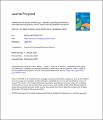| dc.contributor.author | Alho, Iina | |
| dc.contributor.author | Joro, Mirka | |
| dc.contributor.author | Juntunen, Laura | |
| dc.contributor.author | Muotka, Joona | |
| dc.contributor.author | Lappalainen, Raimo | |
| dc.date.accessioned | 2021-01-07T10:24:01Z | |
| dc.date.available | 2021-01-07T10:24:01Z | |
| dc.date.issued | 2021 | |
| dc.identifier.citation | Alho, I., Joro, M., Juntunen, L., Muotka, J., & Lappalainen, R. (2021). Adolescents with poorly controlled type 1 diabetes : psychological flexibility is associated with the glycemic control, quality of life and depressive symptoms. <i>Journal of Contextual Behavioral Science</i>, <i>19</i>, 50-56. <a href="https://doi.org/10.1016/j.jcbs.2020.12.003" target="_blank">https://doi.org/10.1016/j.jcbs.2020.12.003</a> | |
| dc.identifier.other | CONVID_47410950 | |
| dc.identifier.uri | https://jyx.jyu.fi/handle/123456789/73543 | |
| dc.description.abstract | This study investigates the role of psychological flexibility in relation to glycaemic control (HbA1c) and quality of life among adolescents with poorly-controlled diabetes. Adolescents (n = 65, aged 12–16 years) completed the Children and Adolescents Mindfulness Measure (CAMM), the Diabetes Acceptance and Action Scale for Children and Adolescents (DAAS), the Depression Scale (RBDI), and the Health-Related Quality of Life Scale (KINDL-R). HbA1c values were collected from medical records. A higher level of psychological flexibility was associated with better glycaemic control, better quality of life, and lower levels of depressive and anxiety symptoms. Mediation analysis showed that diabetes-related psychological flexibility mediated the relationship between glycaemic control and depressive symptoms as well as quality of life. The observations in the current study support the view that adolescents with type 1 diabetes would benefit from training their psychological flexibility skills. | en |
| dc.format.mimetype | application/pdf | |
| dc.language | eng | |
| dc.language.iso | eng | |
| dc.publisher | Elsevier BV | |
| dc.relation.ispartofseries | Journal of Contextual Behavioral Science | |
| dc.rights | CC BY-NC-ND 4.0 | |
| dc.subject.other | type 1 diabetes | |
| dc.subject.other | adolescence | |
| dc.subject.other | psychological flexibility | |
| dc.subject.other | quality of life | |
| dc.title | Adolescents with poorly controlled type 1 diabetes : psychological flexibility is associated with the glycemic control, quality of life and depressive symptoms | |
| dc.type | article | |
| dc.identifier.urn | URN:NBN:fi:jyu-202101071024 | |
| dc.contributor.laitos | Psykologian laitos | fi |
| dc.contributor.laitos | Department of Psychology | en |
| dc.contributor.oppiaine | Psykologia | fi |
| dc.contributor.oppiaine | Psychology | en |
| dc.type.uri | http://purl.org/eprint/type/JournalArticle | |
| dc.type.coar | http://purl.org/coar/resource_type/c_2df8fbb1 | |
| dc.description.reviewstatus | peerReviewed | |
| dc.format.pagerange | 50-56 | |
| dc.relation.issn | 2212-1447 | |
| dc.relation.volume | 19 | |
| dc.type.version | acceptedVersion | |
| dc.rights.copyright | © 2020 Association for Contextual Behavioral Science. Published by Elsevier Inc. All rights reserved. | |
| dc.rights.accesslevel | openAccess | fi |
| dc.subject.yso | masennus | |
| dc.subject.yso | joustavuus | |
| dc.subject.yso | psykologiset tekijät | |
| dc.subject.yso | nuoruustyypin diabetes | |
| dc.subject.yso | itsehoito | |
| dc.subject.yso | elämänlaatu | |
| dc.subject.yso | nuoret | |
| dc.format.content | fulltext | |
| jyx.subject.uri | http://www.yso.fi/onto/yso/p7995 | |
| jyx.subject.uri | http://www.yso.fi/onto/yso/p17703 | |
| jyx.subject.uri | http://www.yso.fi/onto/yso/p4392 | |
| jyx.subject.uri | http://www.yso.fi/onto/yso/p19788 | |
| jyx.subject.uri | http://www.yso.fi/onto/yso/p19265 | |
| jyx.subject.uri | http://www.yso.fi/onto/yso/p10759 | |
| jyx.subject.uri | http://www.yso.fi/onto/yso/p11617 | |
| dc.rights.url | https://creativecommons.org/licenses/by-nc-nd/4.0/ | |
| dc.relation.doi | 10.1016/j.jcbs.2020.12.003 | |
| jyx.fundinginformation | We thank the Finnish Diabetes Association’s Scholarship Fund (Diabetesliiton stipendirahasto) and the Central Finland Hospital’s Children’s Support Group (Lastu ry) for supporting this study. | |
| dc.type.okm | A1 | |

